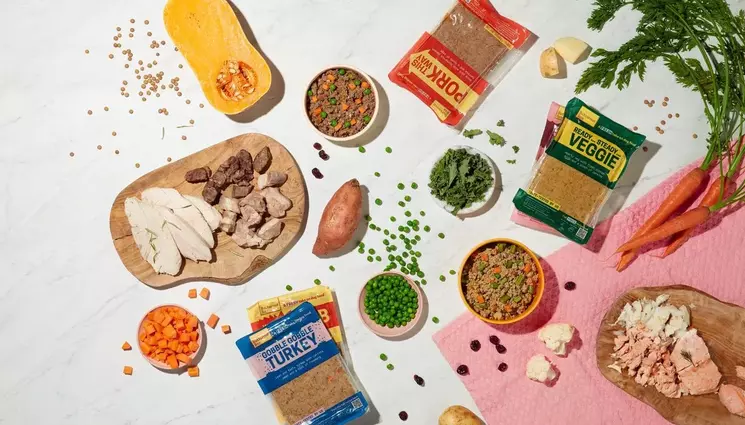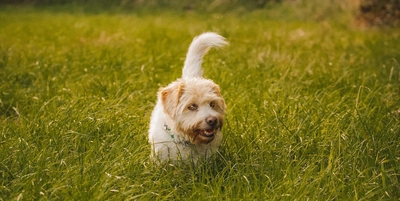Best Dog Food for Anal Gland Issues
- 08 Aug 2023
- 5m read

Anal gland issues in dogs can cause a range of uncomfortable symptoms and, if left untreated, even serious health problems. To help pet owners identify and treat anal gland problems in their pups, this article provides an overview of the symptoms, causes, dietary considerations, and potential treatments.
We'll also explain why Butternut Box is the perfect solution for dogs with anal gland issues. So if you're looking for a tailored food to reduce the risk of future problems and keep your pup happy and healthy, click the Build Your Box button today.
Symptoms of Blocked Anal Glands in Dogs
Anal gland issues in dogs can be uncomfortable and even painful for your dog. Being able to recognise the symptoms of blocked anal glands is key to getting your pup the right treatment and preventing future problems. Here are some things to look out for:
- Dragging their bottom along the ground
- Licking or biting their bottom
- Foul odour coming from your dog's rear-end
- Dark discharge from their bottom, which can range from brownish-blue to black in colour
- Swelling near their bottom
- Difficulty pooping or unusual toilet patterns
It’s important to understand these symptoms so that you can take action and treat any anal gland issues with appropriate diet and lifestyle changes.
Why Do Dogs Anal Glands Fill Up?
Anal glands, or anal sacs, are located on either side of a dog's bottom and contain an odorous fluid used for scent-marking. When this fluid isn't regularly expressed it can build up in the gland causing blockage leading to inflammation, infection and pain. If left untreated, an abscess or rupture can occur which is why it is important to consult a vet if any of the above symptoms show up.
Can Food Cause Anal Gland Issues in Dogs?
It is true that certain foods can contribute to anal gland issues in dogs. High-fat diets and artificial preservatives have been linked to these issues, as they can be difficult for a dog’s digestive system to process. These types of diets are also often lacking in the necessary fibre that helps to support healthy digestion.
The good news is that a high-fibre diet can help reduce the risk of anal gland issues by supporting healthy digestion and helping stools maintain their shape, which helps push out the material from the anal glands when your pup goes to the bathroom. Fibre also helps stimulate intestinal contractions that move food through the digestive tract more quickly, reducing constipation and other common issues. In addition to fibre-rich ingredients like green beans and carrots, a variety of proteins and vegetables should be included in your dog's diet for optimal health.
Some pet parents may choose to switch their pup to a grain-free diet due to allergies or because they believe it is healthier for their pup. However, there is some evidence suggesting that grain-free diets may not be beneficial for all dogs, so you should always consult with your vet before making any major dietary changes.
How to Treat Blocked Anal Glands in Dogs
Managing anal gland issues in dogs can be challenging. To ensure your pup's comfort and well-being, it is important to take a multifaceted approach that involves dietary changes, as well as manual expression of the glands when necessary.
A diet rich in fibre and quality proteins like lean meats and complex carbohydrates such as sweet potatoes and oats can help keep stools firm so that the anal glands are emptied naturally. Additionally, look for ingredients without artificial preservatives or additives which can contribute to digestive problems.
Manual expression should only be done by trained professionals such as vets or groomers who have experience with this procedure. If left untreated infections can become serious so it is important to seek medical attention if you notice your dog exhibiting signs of discomfort or if there is an unpleasant odour coming from their bottom area.
In severe cases where blockages recur frequently or abscesses form due to blocked glands, surgery may be recommended by your vet as a last resort measure.
What to Feed Dogs with Anal Gland Issues
Dogs with anal gland issues require a diet that is rich in fibre, prebiotics, probiotics, omega-3 fatty acids and antioxidants. All of these nutrients are essential for maintaining good gut health and reducing the risk of further anal gland problems. High-fibre diets help to keep stools firm and reduce the likelihood of impacted glands. When choosing what to feed your pup, opt for natural ingredients such as fresh vegetables, lean meats, eggs, and low-fat dairy products whenever possible.
It is also important to avoid foods that contain added sugar, salt or artificial colourings as these can further irritate the anal area. A diet free from these unhealthy additives can make a world of difference to your pup's digestive system and overall wellbeing.
Why Butternut Box is Perfect for Dogs with Anal Gland Issues
At Butternut Box, we use 100% human-quality ingredients sourced from trusted suppliers. Each meal is designed for optimal gut health, the recipes are rich in protein, fibre and low glycemic carbohydrates which can help reduce the risk of anal gland issues in dogs, while still providing nourishing meals that taste delicious.
Plus, our tailored meals are perfectly portioned according to each pup’s age, breed size and activity level so you know they’re getting exactly what they need every day.




